高中英语外研版必修2---Module2 No Drugs-Listening and Vocabulary; Function; Pronunciation and Everyday Englis
文档属性
| 名称 | 高中英语外研版必修2---Module2 No Drugs-Listening and Vocabulary; Function; Pronunciation and Everyday Englis | 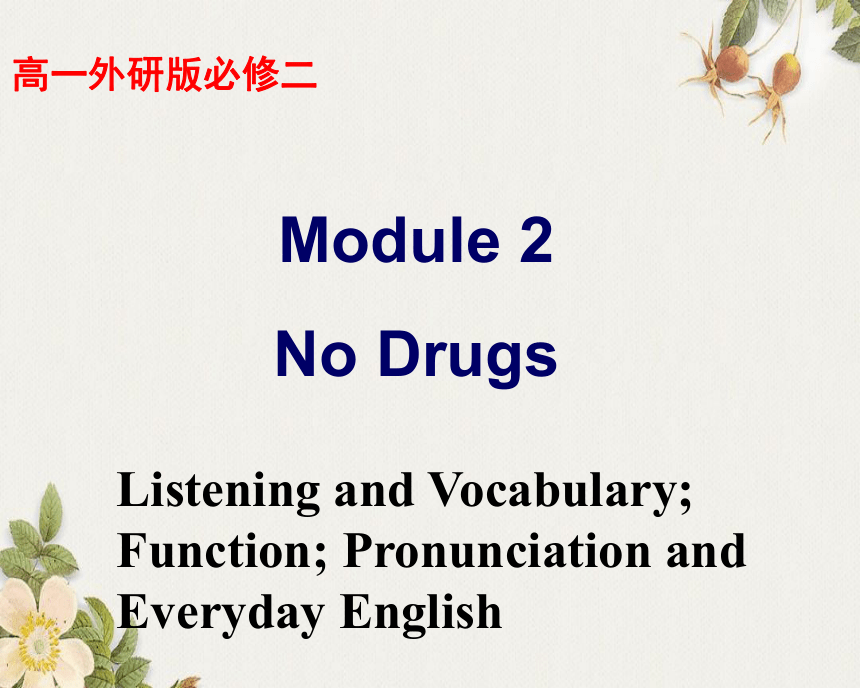 | |
| 格式 | zip | ||
| 文件大小 | 548.0KB | ||
| 资源类型 | 教案 | ||
| 版本资源 | 外研版 | ||
| 科目 | 英语 | ||
| 更新时间 | 2021-05-20 08:02:55 | ||
图片预览


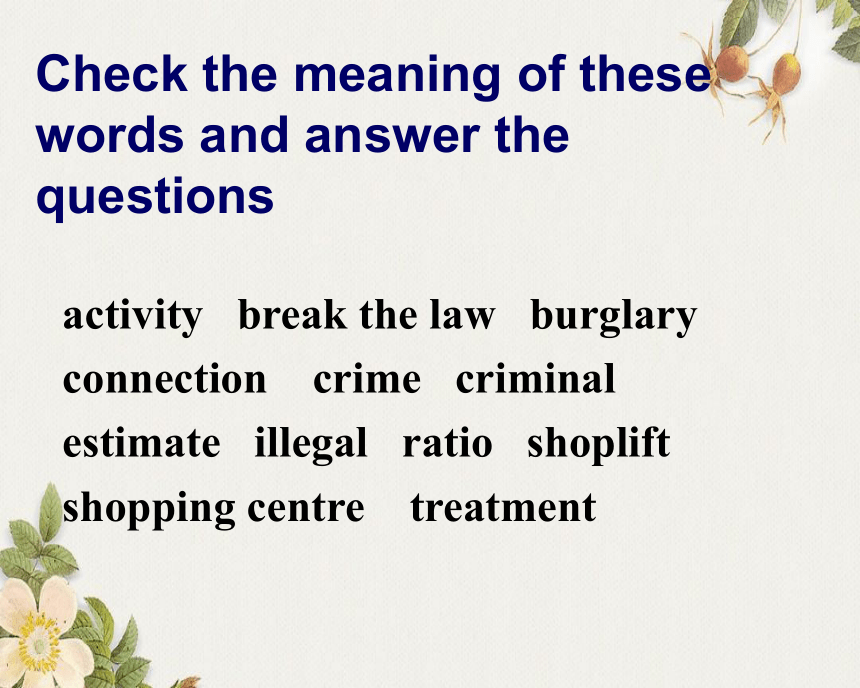
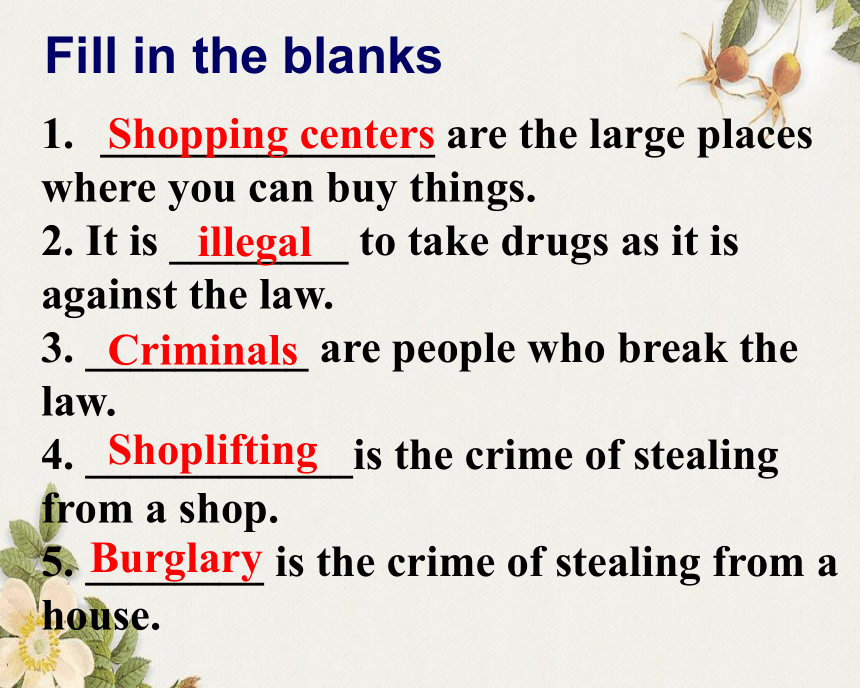

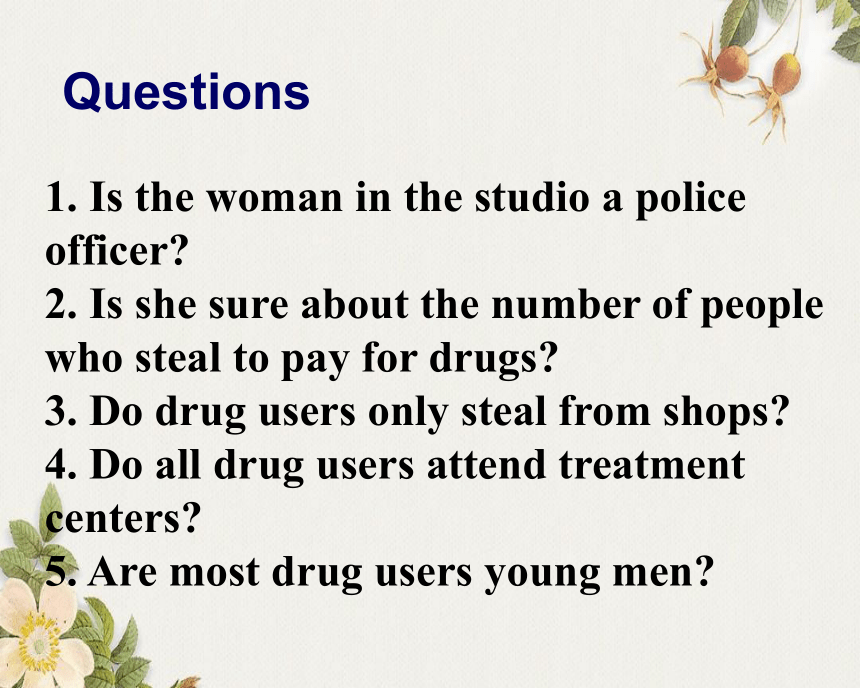
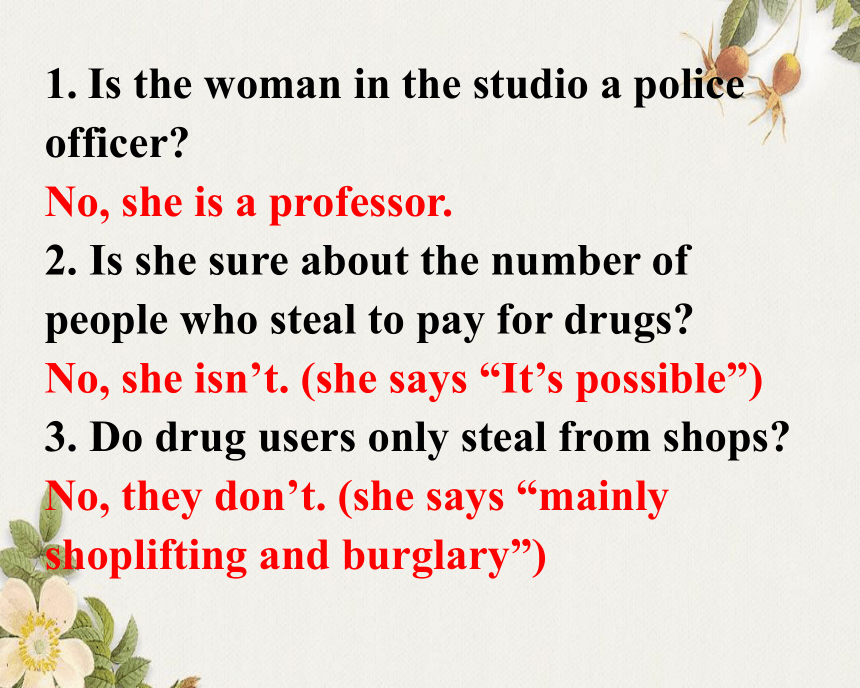
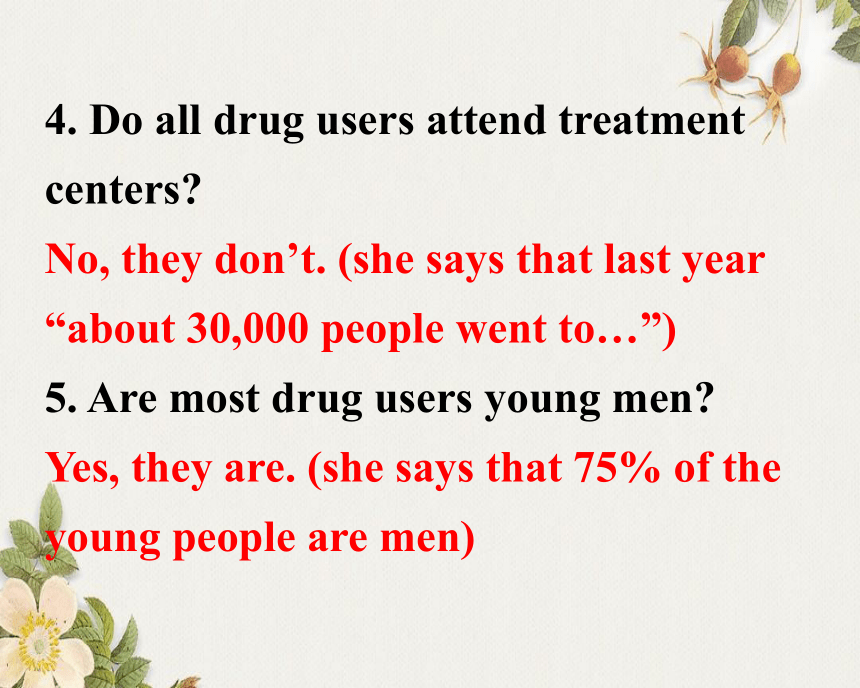

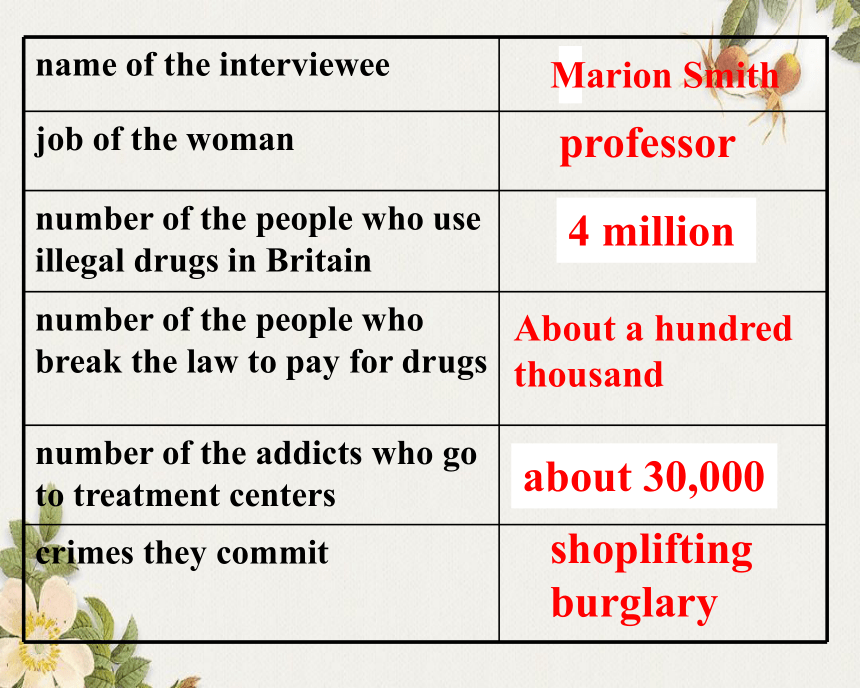


文档简介
(共45张PPT)
Module
2
No
Drugs
高一外研版必修二
Listening
and
Vocabulary;
Function;
Pronunciation
and
Everyday
English
Listening
and
Vocabulary
Check
the
meaning
of
these
words
and
answer
the
questions
activity
break
the
law
burglary
connection
crime
criminal
estimate
illegal
ratio
shoplift
shopping
centre
treatment
Fill
in
the
blanks
_______________
are
the
large
places
where
you
can
buy
things.
2.
It
is
________
to
take
drugs
as
it
is
against
the
law.
3.
__________
are
people
who
break
the
law.
4.
____________is
the
crime
of
stealing
from
a
shop.
5.
________
is
the
crime
of
stealing
from
a
house.
Shopping
centers
illegal
Criminals
Shoplifting
Burglary
Listen
and
answer
the
questions.
Explain
your
answers.
1.
Is
the
woman
in
the
studio
a
police
officer?
2.
Is
she
sure
about
the
number
of
people
who
steal
to
pay
for
drugs?
3.
Do
drug
users
only
steal
from
shops?
4.
Do
all
drug
users
attend
treatment
centers?
5.
Are
most
drug
users
young
men?
Questions
Is
the
woman
in
the
studio
a
police
officer?
No,
she
is
a
professor.
2.
Is
she
sure
about
the
number
of
people
who
steal
to
pay
for
drugs?
No,
she
isn’t.
(she
says
“It’s
possible”)
3.
Do
drug
users
only
steal
from
shops?
No,
they
don’t.
(she
says
“mainly
shoplifting
and
burglary”)
4.
Do
all
drug
users
attend
treatment
centers?
No,
they
don’t.
(she
says
that
last
year
“about
30,000
people
went
to…”)
5.
Are
most
drug
users
young
men?
Yes,
they
are.
(she
says
that
75%
of
the
young
people
are
men)
Detail
information
Listen
to
the
conversation
carefully
and
try
to
fill
in
the
blanks.
If
possible,
you
can
get
help
from
your
deskmate
name
of
the
interviewee
job
of
the
woman
number
of
the
people
who
use
illegal
drugs
in
Britain
number
of
the
people
who
break
the
law
to
pay
for
drugs
number
of
the
addicts
who
go
to
treatment
centers
crimes
they
commit
Marion
Smith
professor
4
million
About
a
hundred
thousand
about
30,000
shoplifting
burglary
It’s
possible
that
a
hundred
thousand
people
steal
in
order
to_________________________.
2.
Some
of
them
behave
so
badly
that
members
of
the
public
_______________________________.
Listen
again
and
complete
these
sentences.
pay
for
their
drug
addiction
call
the
police
3.
Some
people
feel
so
nervous
when
they
see
drug
users
that
they
______________________.
4.
There
are
such
a
lot
of
people
that
there
isn’t
time
_____________.
5.
Drug
users
are
more
likely
to
____________________________.
to
help
them
all
get
into
trouble
at
school
call
the
police
anyway
Listening
material:
Interviewer:
Good
evening,
and
welcome
to
the
show.
With
me
in
the
studio
is
Professor
Marion
Smith,
who
is
an
expert
on
the
connection
between
crime
and
drug
addiction.
Good
evening,
Professor
Smith.
Professor:
Good
evening.
Interviewer:
First
of
all,
how
many
people
use
illegal
drugs
in
Britain?
Professor:
Possibly
four
million
people.
Interviewer:
Really?
Four
million?
Professor:
Yes.
Interviewer:
How
many
of
them
break
the
law
in
order
to
pay
for
their
drugs?
Professor:
We
estimate
that
a
hundred
thousand
people
steal
in
order
to
pay
for
their
drug
addiction.
Interviewer:
A
hundred
thousand?
That’s
incredible!
And
what
kind
of
crimes
do
they
commit?
Professor:
Mainly
shoplifting
–
in
other
words,
stealing
from
shops
–
and
burglary,
stealing
from
houses.
Interviewer:
I
see.
Professor:
And
there’s
another
problem.
Drug
users
get
into
trouble
with
the
police
for
other
reasons
as
well.
Interviewer:
What
kind
of
reasons?
Professor:
Well,
you
often
see
drug
users
in
public
places
–
shopping
centers,
railway
stations,
for
example
–
and
some
of
them
behave
so
badly
that
members
of
the
public
call
the
police.
Some
people
feel
so
nervous
when
they
see
drug
users
that
they
call
the
police
anyway.
Interviewer:
This
is
a
really
bad
problem,
isn’t
it?
Professor:
Absolutely,
but
the
good
news
is
that
drug
users
who
go
to
treatment
centers
usually
stop
their
criminal
activities.
Interviewer:
How
many
addicts
go
to
treatment
centers?
Professor:
Last
year,
about
30,000
people
went
to
drug
treatment
centers.
Interviewer:
Thirty
thousand?
That’s
amazing.
Professor:
Yes,
there
are
such
a
lot
of
people
that
there
isn’t
time
to
help
them
all.
Interviewer:
What
kind
of
people
are
they?
Professor:
Well,
the
majority
are
young
people
in
their
twenties.
And
about
75
percent
of
the
young
people
are
men.
Interviewer:
And
do
all
these
people
live
in
cities?
Professor:
Oh
no.
The
ratio
of
drug
users
in
society
is
the
same
in
cities
and
in
the
countryside.
But
they
all
have
something
in
common.
Interviewer:
What’s
that?
Professor:
Drug
users
are
more
likely
to
get
into
trouble
at
school.
Interviewer:
Professor
Marion
Smith,
thank
you
very
much.
Professor:
Thank
you.
You
are
the
interviewer
and
you
are
required
to
give
a
summary
about
your
interview
and
call
on
people
to
say
NO
to
drugs
before
ending
your
show.
And
you
may
begin
with
---
Ladies
and
gentlemen,
we
know
that
taking
drugs
has
become
a
serious
problem
in
our
society
and
today
we
have
invited
Professor
Smith
to…
Give
A
Summary
1.
Has
anyone
been
to
your
school
to
talk
about
the
danger
of
drugs?
What
are
the
dangers
of
using
drugs?
(to
the
drug
addicts
themselves,
to
the
family
and
the
society)
Let’s
Share
2.
What
do
you
think
of
those
drug
addicts?
What
is
your
attitude
to
those
drug
users?
3.
What
do
you
think
are
the
reasons
for
those
people
to
become
drug
addicts?
What
can
the
society
do
to
help
them?
Language
points
How
many
people
use
illegal
drugs
in
Britain?
illegal
adj.
not
allowed
by
the
law.
legal
adj.
allowed
by
the
law.
take
legal
action
采取法律手段
e.g.
吸毒和赌博(gambling)都是非法
的。
Taking
drugs
and
gambling
are
both
illegal.
2.
How
many
of
them
break
the
law
in
order
to
pay
for
their
drugs?
break
the
law
违法
break
the
rule
违反规定
她没有违法。
She
didn’t
break
the
law.
3.
We
estimate
that
a
hundred
thousand
people
steal
in
order
to
pay
for
their
drug
addiction.
estimate
v.
+
that/what/how
many
据估计70%-90%的车祸发生在晚上。
It
is
estimated
that
between
70
and
90
percent
of
car
accidents
occur
at
night.
4.
The
ratio
of
drug
users
in
society
is
the
same
in
cities
and
in
the
countryside.
ratio
比;比率;【数】比例
学生和老师的比率是三十五比一。
The
ratio
of
students
to
teachers
is
35:1.
十五与五的比率是三比一。
The
ratio
of
15
to
5
is
3
to
1.
我们将它分为三与一之比。
We
divided
it
in
the
ratio
3:1.
5.
Drug
users
are
more
likely
to
get
into
trouble
at
school.
likely
adj.=probable
Sb./sth.
+be
likely
to
do
sth.
It
is
likely
that…
e.g.他可能住在这儿。
He
is
likely
to
live
here.
他可能会出席会议的。
[误]It
is
likely
for
him
to
attend
the
meeting.
[正]He
is
likely
to
attend
the
meeting=It
is
likely
that
he
will
attend
the
meeting.
6.
Which
word
refers
to
somewhere
that
you
can
buy
things?
refer
to
论及,谈到,提及,查阅,参
考,查询,打听涉及,有关
在他的演讲中,他几次提到了圣经。
In
his
speech,
he
referred
to
the
Bible
several
times.
答案请参照本书的最后几页。
Please
refer
to
the
last
page
of
the
book
for
the
answer.
这个规则仅涉及到特殊案例(情况)。
The
rule
refers
to
only
special
cases.
Function
-
Talking
about
results
Read
the
following
sentences
The
doctor
told
Adam
that
he
could
die
if
he
didn’t
stop
taking
crack
cocaine,
so
Adam
took
the
doctor's
advice
and
stopped
immediately.
2.
About
21
million
people
died
during
the
1990s
as
a
result
of
smoking.
3.
As
a
result,
cocaine
users
sometimes
have
heart
attacks.
We
can
use
so,
as
a
result
and
as
a
result
of
to
talk
about
results.
So
is
followed
by
a
sentence,
as
a
result
should
be
followed
by
a
comma
if
it
is
put
at
the
beginning.
As
a
result
of
is
followed
by
a
noun
or
–ing.
Conclusion:
Complete
the
following
sentences
with
so,
as
a
result
or
as
a
result
of.
You
can
do
them
with
your
partners.
1.
Adam
knew
that
taking
drugs
was
bad,
_______
he
stopped.
2.
He
stopped
taking
drugs
____________
meeting
the
doctor.
3.Adam
met
a
doctor
who
explained
the
problem.
_____________,
he
stopped
taking
cocaine.
so
as
a
result
of
As
a
result
4.
Crack
cocaine
is
very
addictive,
_____
users
cannot
easily
stop
using
it.
5.
He
was
extremely
ill
______________
taking
crack
cocaine.
6.
He
became
addicted
to
crack
cocaine,
_________
he
became
very
ill.
so
as
a
result
of
so
Everyday
English
-agree
and
disagree
Read
Part
1
by
yourselves,
and
then
check
them
with
your
partners.
disagreement
strong
agreement
strong
agreement
disagreement
agreement
agreement
disagreement
disagreement
strong
disagreement
Answers:
Part
2:
work
with
a
partner.
Practice
this
conversation.
Complete
the
sentences
with
expressions
from
activity
1.
Answers:
I
agree
with
you.
I
couldn’t
agree
more.
Absolutely!
I
totally
agree
with
you.
Well,
I’m
not
sure
about
that.
I’m
not
sure
I
agree
with
that.
You
can’t
be
serious!
Pronunciation
-
Intonation
of
mood
and
feeling
1.
Listen
and
follow.
2.
Listen
again
and
decide
what
mood
or
feeling
the
speaker
has.
3.
Listen
and
repeat.
angry
happy
Sad
surprised
Write
a
letter
to
a
drug
addict
who
is
trying
to
stop
taking
drugs.
Suppose
you
know
his
experience.
Tell
him
the
about
the
dangers.
Give
him
suggestion.
Homework
Module
2
No
Drugs
高一外研版必修二
Listening
and
Vocabulary;
Function;
Pronunciation
and
Everyday
English
Listening
and
Vocabulary
Check
the
meaning
of
these
words
and
answer
the
questions
activity
break
the
law
burglary
connection
crime
criminal
estimate
illegal
ratio
shoplift
shopping
centre
treatment
Fill
in
the
blanks
_______________
are
the
large
places
where
you
can
buy
things.
2.
It
is
________
to
take
drugs
as
it
is
against
the
law.
3.
__________
are
people
who
break
the
law.
4.
____________is
the
crime
of
stealing
from
a
shop.
5.
________
is
the
crime
of
stealing
from
a
house.
Shopping
centers
illegal
Criminals
Shoplifting
Burglary
Listen
and
answer
the
questions.
Explain
your
answers.
1.
Is
the
woman
in
the
studio
a
police
officer?
2.
Is
she
sure
about
the
number
of
people
who
steal
to
pay
for
drugs?
3.
Do
drug
users
only
steal
from
shops?
4.
Do
all
drug
users
attend
treatment
centers?
5.
Are
most
drug
users
young
men?
Questions
Is
the
woman
in
the
studio
a
police
officer?
No,
she
is
a
professor.
2.
Is
she
sure
about
the
number
of
people
who
steal
to
pay
for
drugs?
No,
she
isn’t.
(she
says
“It’s
possible”)
3.
Do
drug
users
only
steal
from
shops?
No,
they
don’t.
(she
says
“mainly
shoplifting
and
burglary”)
4.
Do
all
drug
users
attend
treatment
centers?
No,
they
don’t.
(she
says
that
last
year
“about
30,000
people
went
to…”)
5.
Are
most
drug
users
young
men?
Yes,
they
are.
(she
says
that
75%
of
the
young
people
are
men)
Detail
information
Listen
to
the
conversation
carefully
and
try
to
fill
in
the
blanks.
If
possible,
you
can
get
help
from
your
deskmate
name
of
the
interviewee
job
of
the
woman
number
of
the
people
who
use
illegal
drugs
in
Britain
number
of
the
people
who
break
the
law
to
pay
for
drugs
number
of
the
addicts
who
go
to
treatment
centers
crimes
they
commit
Marion
Smith
professor
4
million
About
a
hundred
thousand
about
30,000
shoplifting
burglary
It’s
possible
that
a
hundred
thousand
people
steal
in
order
to_________________________.
2.
Some
of
them
behave
so
badly
that
members
of
the
public
_______________________________.
Listen
again
and
complete
these
sentences.
pay
for
their
drug
addiction
call
the
police
3.
Some
people
feel
so
nervous
when
they
see
drug
users
that
they
______________________.
4.
There
are
such
a
lot
of
people
that
there
isn’t
time
_____________.
5.
Drug
users
are
more
likely
to
____________________________.
to
help
them
all
get
into
trouble
at
school
call
the
police
anyway
Listening
material:
Interviewer:
Good
evening,
and
welcome
to
the
show.
With
me
in
the
studio
is
Professor
Marion
Smith,
who
is
an
expert
on
the
connection
between
crime
and
drug
addiction.
Good
evening,
Professor
Smith.
Professor:
Good
evening.
Interviewer:
First
of
all,
how
many
people
use
illegal
drugs
in
Britain?
Professor:
Possibly
four
million
people.
Interviewer:
Really?
Four
million?
Professor:
Yes.
Interviewer:
How
many
of
them
break
the
law
in
order
to
pay
for
their
drugs?
Professor:
We
estimate
that
a
hundred
thousand
people
steal
in
order
to
pay
for
their
drug
addiction.
Interviewer:
A
hundred
thousand?
That’s
incredible!
And
what
kind
of
crimes
do
they
commit?
Professor:
Mainly
shoplifting
–
in
other
words,
stealing
from
shops
–
and
burglary,
stealing
from
houses.
Interviewer:
I
see.
Professor:
And
there’s
another
problem.
Drug
users
get
into
trouble
with
the
police
for
other
reasons
as
well.
Interviewer:
What
kind
of
reasons?
Professor:
Well,
you
often
see
drug
users
in
public
places
–
shopping
centers,
railway
stations,
for
example
–
and
some
of
them
behave
so
badly
that
members
of
the
public
call
the
police.
Some
people
feel
so
nervous
when
they
see
drug
users
that
they
call
the
police
anyway.
Interviewer:
This
is
a
really
bad
problem,
isn’t
it?
Professor:
Absolutely,
but
the
good
news
is
that
drug
users
who
go
to
treatment
centers
usually
stop
their
criminal
activities.
Interviewer:
How
many
addicts
go
to
treatment
centers?
Professor:
Last
year,
about
30,000
people
went
to
drug
treatment
centers.
Interviewer:
Thirty
thousand?
That’s
amazing.
Professor:
Yes,
there
are
such
a
lot
of
people
that
there
isn’t
time
to
help
them
all.
Interviewer:
What
kind
of
people
are
they?
Professor:
Well,
the
majority
are
young
people
in
their
twenties.
And
about
75
percent
of
the
young
people
are
men.
Interviewer:
And
do
all
these
people
live
in
cities?
Professor:
Oh
no.
The
ratio
of
drug
users
in
society
is
the
same
in
cities
and
in
the
countryside.
But
they
all
have
something
in
common.
Interviewer:
What’s
that?
Professor:
Drug
users
are
more
likely
to
get
into
trouble
at
school.
Interviewer:
Professor
Marion
Smith,
thank
you
very
much.
Professor:
Thank
you.
You
are
the
interviewer
and
you
are
required
to
give
a
summary
about
your
interview
and
call
on
people
to
say
NO
to
drugs
before
ending
your
show.
And
you
may
begin
with
---
Ladies
and
gentlemen,
we
know
that
taking
drugs
has
become
a
serious
problem
in
our
society
and
today
we
have
invited
Professor
Smith
to…
Give
A
Summary
1.
Has
anyone
been
to
your
school
to
talk
about
the
danger
of
drugs?
What
are
the
dangers
of
using
drugs?
(to
the
drug
addicts
themselves,
to
the
family
and
the
society)
Let’s
Share
2.
What
do
you
think
of
those
drug
addicts?
What
is
your
attitude
to
those
drug
users?
3.
What
do
you
think
are
the
reasons
for
those
people
to
become
drug
addicts?
What
can
the
society
do
to
help
them?
Language
points
How
many
people
use
illegal
drugs
in
Britain?
illegal
adj.
not
allowed
by
the
law.
legal
adj.
allowed
by
the
law.
take
legal
action
采取法律手段
e.g.
吸毒和赌博(gambling)都是非法
的。
Taking
drugs
and
gambling
are
both
illegal.
2.
How
many
of
them
break
the
law
in
order
to
pay
for
their
drugs?
break
the
law
违法
break
the
rule
违反规定
她没有违法。
She
didn’t
break
the
law.
3.
We
estimate
that
a
hundred
thousand
people
steal
in
order
to
pay
for
their
drug
addiction.
estimate
v.
+
that/what/how
many
据估计70%-90%的车祸发生在晚上。
It
is
estimated
that
between
70
and
90
percent
of
car
accidents
occur
at
night.
4.
The
ratio
of
drug
users
in
society
is
the
same
in
cities
and
in
the
countryside.
ratio
比;比率;【数】比例
学生和老师的比率是三十五比一。
The
ratio
of
students
to
teachers
is
35:1.
十五与五的比率是三比一。
The
ratio
of
15
to
5
is
3
to
1.
我们将它分为三与一之比。
We
divided
it
in
the
ratio
3:1.
5.
Drug
users
are
more
likely
to
get
into
trouble
at
school.
likely
adj.=probable
Sb./sth.
+be
likely
to
do
sth.
It
is
likely
that…
e.g.他可能住在这儿。
He
is
likely
to
live
here.
他可能会出席会议的。
[误]It
is
likely
for
him
to
attend
the
meeting.
[正]He
is
likely
to
attend
the
meeting=It
is
likely
that
he
will
attend
the
meeting.
6.
Which
word
refers
to
somewhere
that
you
can
buy
things?
refer
to
论及,谈到,提及,查阅,参
考,查询,打听涉及,有关
在他的演讲中,他几次提到了圣经。
In
his
speech,
he
referred
to
the
Bible
several
times.
答案请参照本书的最后几页。
Please
refer
to
the
last
page
of
the
book
for
the
answer.
这个规则仅涉及到特殊案例(情况)。
The
rule
refers
to
only
special
cases.
Function
-
Talking
about
results
Read
the
following
sentences
The
doctor
told
Adam
that
he
could
die
if
he
didn’t
stop
taking
crack
cocaine,
so
Adam
took
the
doctor's
advice
and
stopped
immediately.
2.
About
21
million
people
died
during
the
1990s
as
a
result
of
smoking.
3.
As
a
result,
cocaine
users
sometimes
have
heart
attacks.
We
can
use
so,
as
a
result
and
as
a
result
of
to
talk
about
results.
So
is
followed
by
a
sentence,
as
a
result
should
be
followed
by
a
comma
if
it
is
put
at
the
beginning.
As
a
result
of
is
followed
by
a
noun
or
–ing.
Conclusion:
Complete
the
following
sentences
with
so,
as
a
result
or
as
a
result
of.
You
can
do
them
with
your
partners.
1.
Adam
knew
that
taking
drugs
was
bad,
_______
he
stopped.
2.
He
stopped
taking
drugs
____________
meeting
the
doctor.
3.Adam
met
a
doctor
who
explained
the
problem.
_____________,
he
stopped
taking
cocaine.
so
as
a
result
of
As
a
result
4.
Crack
cocaine
is
very
addictive,
_____
users
cannot
easily
stop
using
it.
5.
He
was
extremely
ill
______________
taking
crack
cocaine.
6.
He
became
addicted
to
crack
cocaine,
_________
he
became
very
ill.
so
as
a
result
of
so
Everyday
English
-agree
and
disagree
Read
Part
1
by
yourselves,
and
then
check
them
with
your
partners.
disagreement
strong
agreement
strong
agreement
disagreement
agreement
agreement
disagreement
disagreement
strong
disagreement
Answers:
Part
2:
work
with
a
partner.
Practice
this
conversation.
Complete
the
sentences
with
expressions
from
activity
1.
Answers:
I
agree
with
you.
I
couldn’t
agree
more.
Absolutely!
I
totally
agree
with
you.
Well,
I’m
not
sure
about
that.
I’m
not
sure
I
agree
with
that.
You
can’t
be
serious!
Pronunciation
-
Intonation
of
mood
and
feeling
1.
Listen
and
follow.
2.
Listen
again
and
decide
what
mood
or
feeling
the
speaker
has.
3.
Listen
and
repeat.
angry
happy
Sad
surprised
Write
a
letter
to
a
drug
addict
who
is
trying
to
stop
taking
drugs.
Suppose
you
know
his
experience.
Tell
him
the
about
the
dangers.
Give
him
suggestion.
Homework
